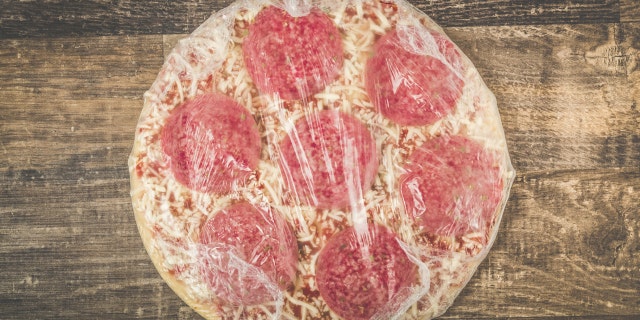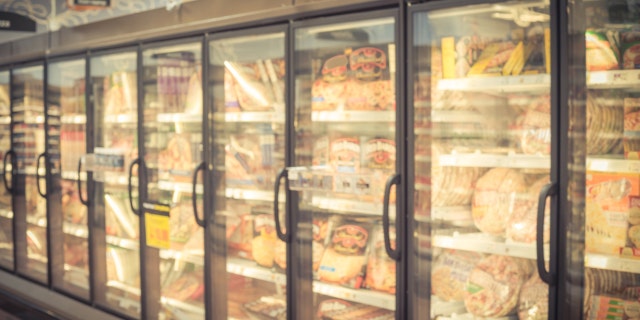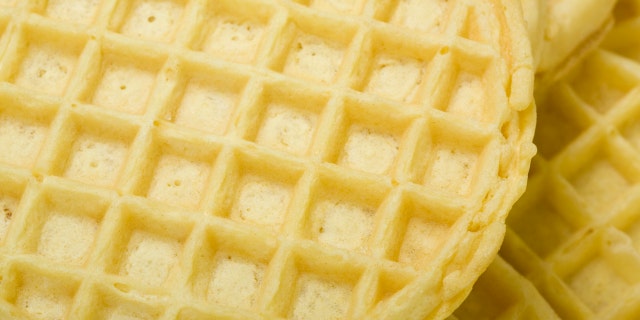These Are the Worst Frozen Foods Out There for Your Health
NEWYou can now listen to Fox News articles!
Many of us head first to the frozen foods aisle when we go grocery shopping. Could this common practice be sabotaging our health? Like most things on the nutrition front, it depends.
“When it comes to frozen foods, several nutrients are of major concern for heart health; salt, sugar and unhealthy fats,” said registered dietitian Angela L. Lago, also known as “The Mental Wellness Dietitian.” “Not only are foods that contain an excess of these nutrients inflammatory, they are also key drivers for obesity, heart disease, high blood pressure and diabetes.”
The American Heart Association (AHA) recommends no more than 2,300 milligrams of sodium per day. The “ideal limit” is no more than 1,500 mg per day for most adults, especially those who have high blood pressure, according to the AHA.
Lago said that some frozen foods like frozen vegetables, fruits and whole grain products are not all bad, though there are categories individuals looking to improve or protect heart health should avoid.
“When frozen food is the only choice, compare food labels and choose the product with less salt, sugar and trans fat,” she said, noting that processed, packaged foods make up 70% of the salt in average Americans’ diets.
THE WORST FOODS FOR HEART HEALTH, ACCORDING TO EXPERTS
“Ultra-processed foods are not only loaded with sugar, fats, and/or salt, but also include preservatives and artificial colors and flavors that allow the products to have a longer shelf life. These ultra-processed foods are associated with a greater risk of cardiovascular disease,” said Lago, pointing to the 2021 dietary guidance to improve cardiovascular health from the AHA.
Packaged Frozen Dinners
Noting a review published in the International Journal of Molecular Sciences about sodium intake and heart failure, Kaleigh McMordie, a registered dietitian nutritionist of the LivelyTable.com, said, “While there are certainly healthier options available among single-serve frozen dinners, many are notoriously unhealthy. One of the main reasons is the sodium level. Frozen dinners can have upwards of 1,000 mg of sodium, often from sodium-based preservatives, contributing more than half a day’s recommended amount of sodium.”
THESE ARE THE BEST FOODS FOR YOUR HEART, EXPERTS SAY
“Too much sodium, especially from frozen and packaged foods, is a contributing factor to hypertension, stroke, and heart disease,” she added. “Frozen dinners are also usually severely lacking in vegetables.”
McMordie said that if you must buy a frozen dinner, read the label to find a lower sodium option and pair it with a salad or other vegetable side.
(You may want to split it into multiple portions, too, even if it’s marked as a single-serve meal.)
THESE ARE THE WORST FOODS FOR YOUR HEALTH, EXPERTS SAY
Frozen Pizza Roll Snacks
A combination of icky additives, calories galore, and excess fat and sodium is the name of the game when it comes to most frozen pizza roll snacks.
“These snacks are far from a slice of pizza. They’re typically filled with sodium, fat, lots of additives for preservation, such as nitrates and phosphates and even imitation cheese,” said McMordie, highlighting a study published in the German Medical Association’s science journal, Deutsches Arzteblatt international, about the potential of added phosphates to damage heart health.
“I recommend having a slice of real, thin crust pizza if you’re craving pizza.”
Frozen Pizza

Frozen pizza can be just as bad as frozen roll pizza snacks.
(iStock)
Frozen pizza can be just as bad as the frozen roll pizza snacks discussed above.
“Frozen pizza is a high-calorie food that is loaded with calories, salt and fat. While there are healthier choices, such as thin crust options topped with vegetables, most frozen pizzas have a thicker refined grain crust, topped with cheese and processed meat,” said Lago.
THE BEST FOODS FOR A GOOD NIGHT’S SLEEP
As Lago explained, frozen pizza checks several of the boxes for evidence-based dietary practices you should avoid in order to promote cardiovascular health.
Instead:
-Choose foods made primarily with whole grains rather than refined grains
-Choose healthy choices of protein, lean cuts and avoid processed forms
-Choose foods with little or no salt
-Choose low-fat or fat-free dairy products
Frozen Pot Pies
We know they can taste good, but not so good that it’s worth compromising your health.
“While frozen pot pies may provide us comfort, these are one of the highest calorie and fat-containing frozen foods,” said Allison Tallman, registered dietitian at SportingSmiles.com.
“There is limited beneficial nutritional value coming from this product. The excess calories and fat may lead to weight gain,” she continued, adding that weight gain can lead to an array of diseases such as heart disease, high cholesterol, metabolic syndrome or type 2 diabetes.
Frozen Corn Dogs
This state fair staple should be enjoyed — occasionally — at such events, and not stored in your freezer for easy access whenever a corn dog craving strikes.
“Processed meats, such as sausages, bacon and hot dogs, are some of the worst offenders when it comes to heart health, mostly because of the sodium content and chemical preservatives in them. Studies have linked higher processed meat intake to higher risk of heart disease and diabetes,” said McMordie.
CLICK HERE TO GET THE FOX NEWS APP
“Frozen corn dogs not only have highly processed meat, but that meat is also wrapped in a sugary batter devoid of any real nutrients then fried before being frozen,” she elaborated, suggesting people limit processed meat intake to less than one serving per week for heart health.
Frozen French Fries

When buying frozen French fries, be sure to scan the ingredients list and look for added oils and salt.
(iStock)
Be sure to scan the ingredients list when buying these and look for added oils and salt.
“When you order French fries, you’re also getting a heaping helping of fat and calories,” said Janet Coleman, registered dietitian of TheConsumerMag.com.
She noted that an order of McDonald’s fries contains 530 calories and 22 grams of fat; at KFC, a large order of fries has 610 calories and 25 grams of fat; and Wendy’s Natural-Cut Fries have 610 calories and 28 grams of fat.
Frozen French fries you buy at the supermarket can have a similarly poor nutrition profile, so buyer beware.
Frozen Calzones
Tallman puts this on the list due to the high amounts of sodium found in the product.
“These calzones often have about 1,700 mg of sodium in just one serving! An excess of sodium in the diet can lead to increased blood pressure,” she said.
Considering you can hit your daily sodium allotment in just one frozen calzone, it may be worth a pass.
CLICK HERE TO SIGN UP FOR OUR LIFESTYLE NEWSLETTER

Many of us head first to the frozen foods aisle when grocery shopping. Could this common practice be sabotaging our health? Like most things on the nutrition front, it depends.
(iStock)
Sweet and Sour Chicken
“Sweet and sour chicken is a good source of protein (from the chicken), but is secretly packed with a ton of added sugar,” said Tallman. “Some have upward of 40g of added sugar per serving. Added sugar is negative for your health because it can increase the risk of obesity, which leads to heart disease.”
If you’re craving sweet and sour chicken, try making it from scratch; that way, you can control exactly how much sugar you use.
Frozen Toaster Pastries
Add this popular breakfast item to your list of foods to avoid in the frozen foods aisle.
“Frozen breakfast pastries consist of several forms of highly processed carbohydrates and sugar with no real nutritional value, not to mention all the chemical preservatives. Regular intake of these kinds of highly processed foods — high in refined white flour, refined sugar and high fructose corn syrup — is associated with a poor lipid profile,” said McMordie, referencing a study published in Current Atherosclerosis Reports on carbohydrates and blood lipids.
“High triglyceride and LDL cholesterol levels in the blood, caused by high refined carb intake, is a major risk factor for heart disease. Skip the toaster pastries and opt for a breakfast that has a balance of healthy fat, protein, and carbohydrates from whole grains or fruit.”
How about whipping up some nutritious apple pie breakfast tacos?
FOLLOW US ON FACEBOOK FOR MORE FOX LIFESTYLE NEWS
Frozen Baked Goods

“Frozen baked goods, such as cinnamon rolls, biscuits, waffles, and dessert items are loaded with salt, sugar, and fat,” says Angela L. Lago MS, RDN, LDN.
(iStock)
There are other frozen sweets you may want to skip.
“Frozen baked goods, such as cinnamon rolls, biscuits, waffles and dessert items are loaded with salt, sugar and fat,” said Lago, nodding at a 2019 study published in BMJ about the connection between ultra-processed foods and the risk of heart disease.
“While they may be a convenient breakfast or sweet treat, these items should never be a staple in one’s diet,” Lago added. “Many times, even though you cannot taste the salt, it’s still there in many baked goods. Items in the frozen baked goods category are [also] often low in fiber and vitamin density.”
" Conservative News Daily does not always share or support the views and opinions expressed here; they are just those of the writer."

Now loading...